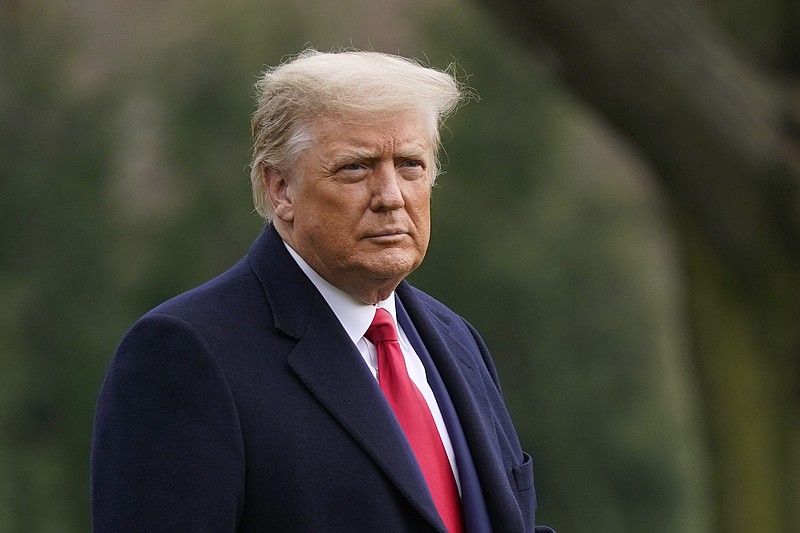WEST PALM BEACH, Fla. -- Unemployment benefits for millions of Americans struggling to make ends meet were set to lapse at midnight Saturday unless President Donald Trump signed an end-of-year covid relief and spending bill that had been considered a done deal before his sudden objections.
Trump's refusal to sign the bipartisan package as he demands larger covid relief checks and complaints about "pork" spending also could force a federal government shutdown when money runs out at 12:01 a.m. Tuesday in the middle of the pandemic.
"It's a chess game and we are pawns," said Lanetris Haines, a self-employed single mother of three in South Bend, Ind., who stands to lose her $129 weekly jobless benefit unless Trump signs the package into law or succeeds in his quest for changes.
Washington has been reeling since Trump threw the package into limbo after it won sweeping approval in both chambers of Congress and after the White House assured Republican leaders that Trump would support it.
Instead, he has assailed the bill's plan to provide $600 checks to most Americans -- insisting it should be $2,000. House Republicans swiftly rejected that idea during a Christmas Eve session. But Trump has not been swayed.
[CORONAVIRUS: Click here for our complete coverage » arkansasonline.com/coronavirus]
"I simply want to get our great people $2000, rather than the measly $600 that is now in the bill," Trump tweeted Saturday from Palm Beach, Fla., where he is spending the holiday. "Also, stop the billions of dollars in 'pork.'"
President-elect Joe Biden called on Trump to sign the bill immediately as two federal programs providing unemployment aid were set to expire Saturday.
"It is the day after Christmas, and millions of families don't know if they'll be able to make ends meet because of President Donald Trump's refusal to sign an economic relief bill approved by Congress with an overwhelming and bipartisan majority," Biden said in a statement. He accused Trump of an "abdication of responsibility" that could have "devastating consequences."
"I've been talking to people who are scared they're going to be kicked out from their homes, during the Christmas holidays, and still might be if we don't sign this bill," said Rep. Debbie Dingell, D-Mich.
Lauren Bauer, a fellow in economic studies at the Brookings Institution, has calculated that 11 million people would lose aid from the programs immediately without additional relief; millions more would exhaust other unemployment benefits within weeks.
[Video not showing up above? Click here to watch » https://www.youtube.com/watch?v=uZgA_0GhEfM]
Andrew Stettner, an unemployment insurance expert and senior fellow at the Century Foundation think tank, said the number may be closer to 14 million because joblessness has spiked since Thanksgiving.
"All these folks and their families will suffer if Trump doesn't sign the d* bill," Heidi Shierholz, director of policy at the liberal Economic Policy Institute, tweeted Wednesday.
How and when people are affected by the lapse depends on the state they live in, the program they are relying on and when they applied for benefits. In some states, people on regular unemployment insurance could continue to receive payments under a program that extends benefits when the jobless rate surpasses a certain threshold, Stettner said.
About 9.5 million people, however, rely on the Pandemic Unemployment Assistance program that expires Saturday. That program made unemployment insurance available to freelancers, gig workers and others who are normally not eligible.
While payments could be received retroactively, any gap means more hardship and uncertainty for Americans who have already grappled with bureaucratic delays, often depleting much of their savings to stay afloat while waiting for payments to kick in.
They are people like Earl McCarthy, a father of four who lives in South Fulton, Ga., and has been relying on unemployment since losing his job as a sales representative for a luxury senior living community. He said he will be left with no income by the second week of January if Trump doesn't sign the bill.
McCarthy said he already burned through much of his savings as he waited five months to begin receiving his unemployment benefits. After leaving weekly messages with the unemployment agency, McCarthy reached out to the South Fulton mayor's office, then to his state legislative representative. He finally started getting payments in November.
"The entire experience was horrifying," said McCarthy, who is receiving about $350 a week in unemployment insurance.
"For me, I shudder to think if I had not saved anything or had an emergency fund through those five months, where would we have been?" he said. "It's going to be difficult if the president doesn't sign this bill."
The bill awaiting Trump's signature also would activate a weekly $300 federal supplement to unemployment payments.
Lack of action on the bill would lead to the expiration of eviction protections and put on hold a new round of subsidies for hard-hit businesses, restaurants and theaters, along with money to help schools and vaccine distribution.
The relief is attached to a $1.4 trillion government funding bill to keep the federal government operating.
